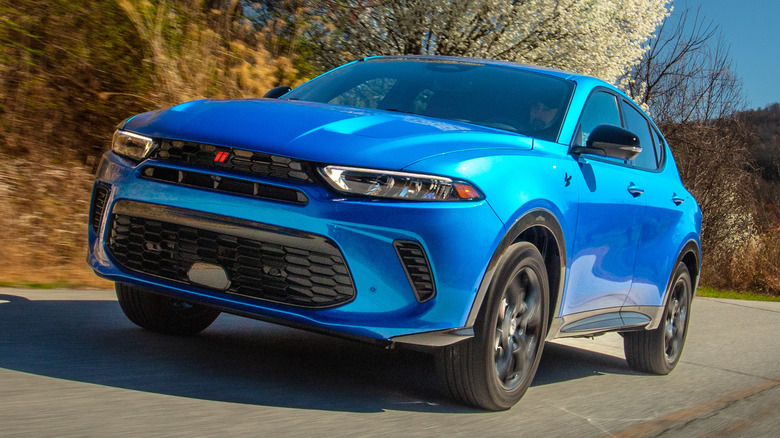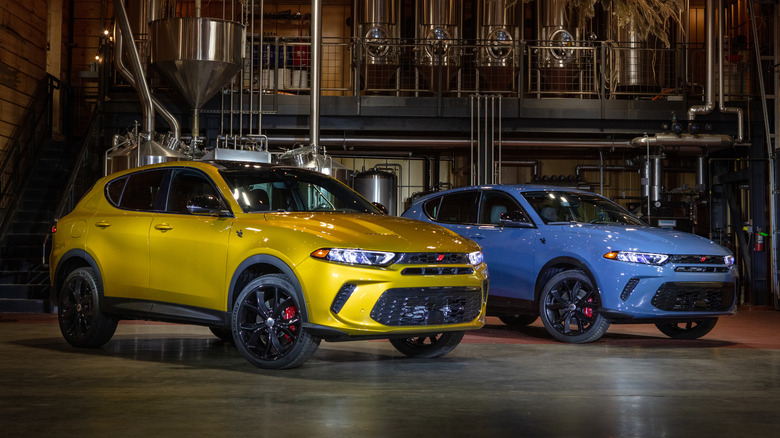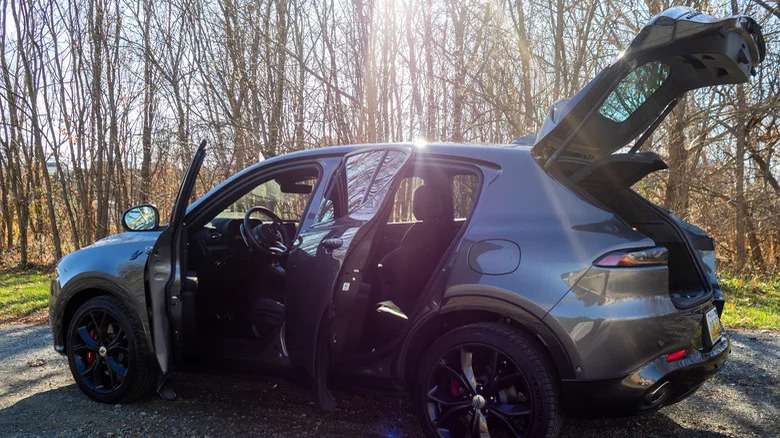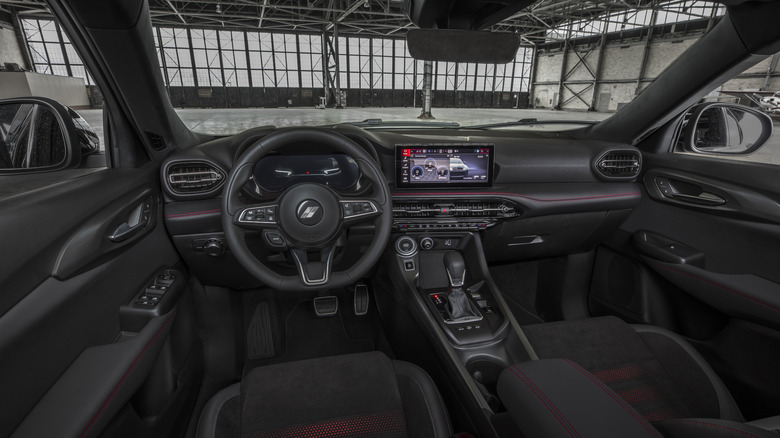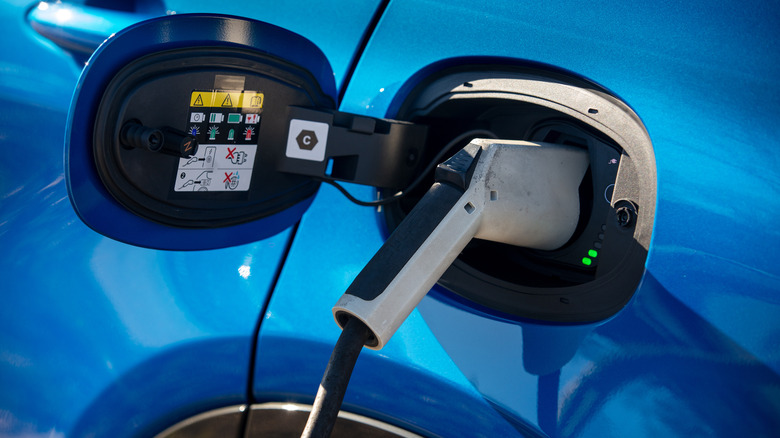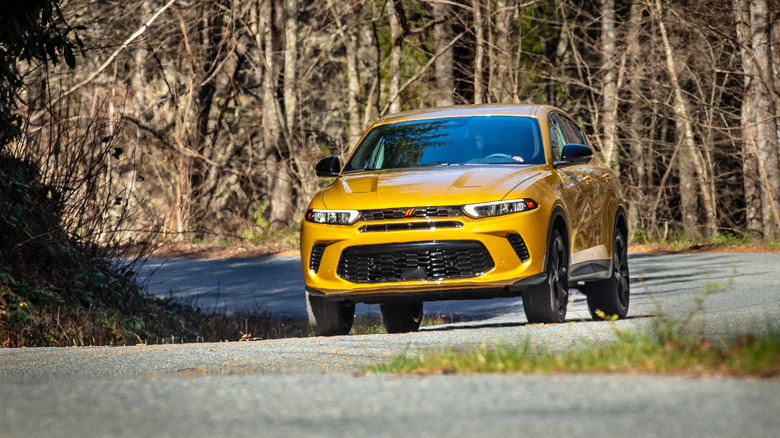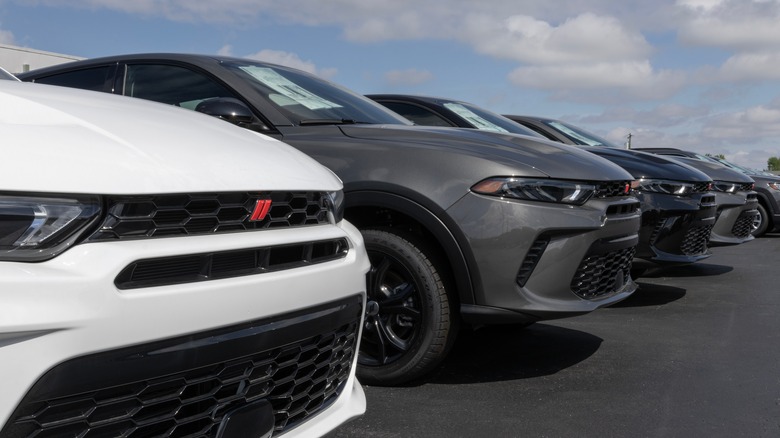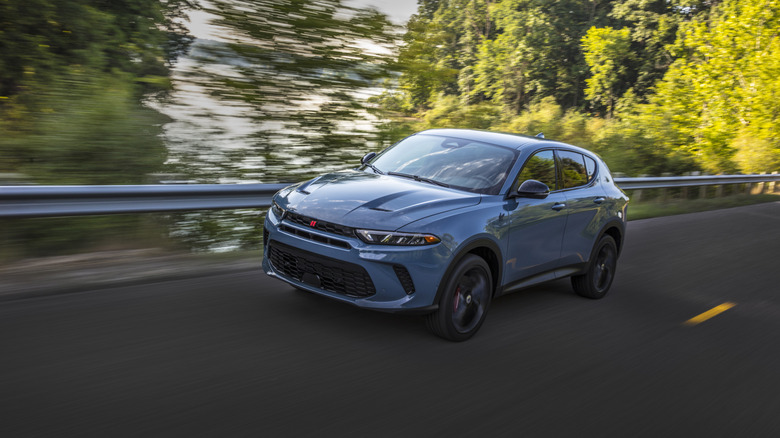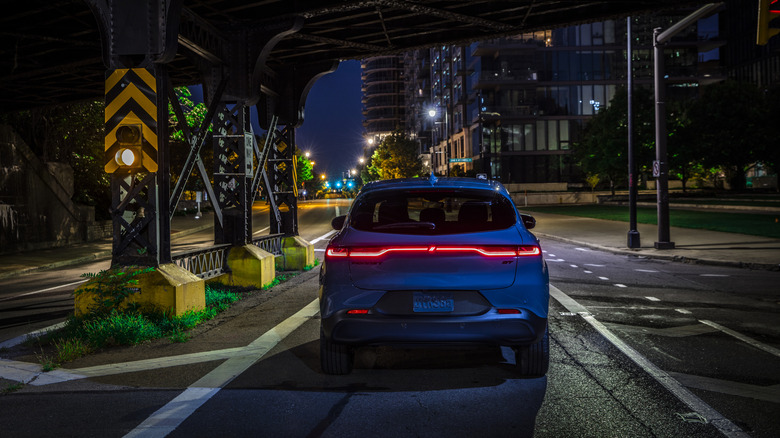What's Wrong With The Dodge Hornet? Recalls, Poor Sales, And Owner Complaints
Crossovers are big business for carmakers, with the global crossover market estimated to be worth $541 billion in 2022 according to a study by Allied Market Research. Demand is forecast to keep rising, and as a result, virtually every major carmaker now offers at least one crossover in its lineup. The sole crossover in Dodge's current lineup is the Hornet, which was launched for the 2023 model year and offers a cheaper, more compact alternative to the Durango SUV.
The Hornet debuted to considerable interest, particularly since it appeared at a time of great change for the brand. Dodge discontinued the long-running Challenger and Charger in a bid to ramp up its switch to electrification, and with a plug-in hybrid Hornet available, the crossover was the first taste of what the brand's future might look like. Unfortunately for Dodge — and its parent company Stellantis — things aren't looking great so far. The Hornet packs some neat features, but it's been beset by problems since its launch, and many owners aren't happy.
Dodge needs the Hornet
It's worth reiterating that the Hornet is a vital model for Dodge to get right. It is, to date, the brand's only entry into the fiercely competitive crossover segment, and with so many excellent rivals to choose from, buyers can afford to be picky. It's also a glimpse into Dodge's electrified future, with the brand betting heavily on its upcoming muscle EV range, where it's bringing back big names like the Charger Daytona.
Given this importance, it wouldn't be unreasonable to expect a model that emphasizes the brand's all-American heritage and is proudly designed from the ground up in-house. In fact, the Hornet is instead based on the Alfa Romeo Tonale, a Stellantis stablemate with which it shares most of its underpinnings. Both the Tonale and the Hornet are built at the same Stellantis plant in Italy, with the Dodge pitched as the more affordable, America-centric version of the two. There is no electric-only variant of the Hornet available, but a 1.3L four cylinder plug-in hybrid powertrain is standard for higher trims.
It didn't win over SlashGear's reviewer
After putting the Dodge Hornet R/T PHEV through its paces, SlashGear's reviewer came away with mixed feelings about the car. Its powertrain was as zippy as would be expected for a plug-in hybrid, and the all-electric driving range was appreciated even if the Hornet's lack of Level 3 charging support meant that some charging stations were off limits. The interior space was around average for the segment — not exceptionally roomy, particularly in the back row, but enough for occasional rear passengers.
However, the biggest sticking point during SlashGear's time with the car was the multiple electrical issues that became apparent. The electric seat adjustment stopped working twice during testing, although inexplicably began working again after the car was restarted a while later. The 360-degree camera was also temperamental, cutting out for no apparent reason while parking. Italian cars are infamous for their patchy electrics, and it seemed the Tonale-based Hornet was no different, although as it would later emerge, owners reported much worse electrical issues than our relatively minor inconveniences.
Ironically, SlashGear also tested the Hornet's sibling, the Alfa Romeo Tonale PHEV, and it didn't suffer from any electrical issues during our testing. However, that's not the case for all Tonale drivers — there are plenty of reports of both electrical and non-electrical faults on owners' forums.
The Hornet suffers from persistent, infuriating electrical issues
Hornet owners have complained about a range of issues with their cars, but the most common is electrical gremlins. It seems that it isn't just one feature or system that's prone to failure either. The Autopian put together a rundown of some of the most concerning issues reported so far, with everything from defective cruise control to burning hot heated steering wheels being reported.
Adaptive cruise control is also cited as a major headache for owners, with the system still causing problems even after a patch was released to try and fix it. Stellantis will no doubt continue to release patches to try and address as many of the electrical problems as possible, but in the meantime, owners are stuck with cars that are unnerving, unenjoyable, and in some cases potentially unsafe to drive. Yet, that's not even the end of their issues.
Some Hornets might catch fire
If dealing with electrical issues wasn't enough, Hornet owners were also dealt the unwelcome news that their car was at risk of catching fire. This was triggered by a safety recall starting in September 2023, and affected around 4,100 Dodge Hornet and Alfa Romeo Tonale vehicles. The issue stemmed from a rogue battery cable, and applied to the plug-in hybrid variants of both cars.
According to the recall notice, "the 12-volt battery positive cable and/or high voltage connector cable may not be tightened properly, which can overheat the electrical connections and result in a fire while parked or driving." The notice advises owners to park outside and away from buildings and other structures until the car has been brought back to the dealership for remedial work to be completed.
A second wiring-related recall was also issued in October 2023, although it doesn't pose as much immediate danger to drivers. According to the recall notice, the pedestrian alert siren might be improperly connected or missing altogether, again meaning Hornet owners are required to bring their car back to the dealer for repairs.
The Hornet's brake pedal might fail
Another particularly troubling recall was issued in October 2024, with more than 21,000 examples of the Hornet and Tonale affected. The recall notice states that the brake pedal is liable to collapse, causing the owner to be unable to brake while driving. To mitigate the problem, owners will have to take their Hornet to a Dodge dealer, where the brake pedal arm will be reinforced. However, even that has not been a painless process for some owners.
According to multiple complaints lodged to the NHTSA, owners have taken their Hornet to a dealership in October 2024 only to be told that the necessary part for the fix won't be available until January 2025. While none of the complainants had experienced a brake pedal failure at the point that the complaint was made, the idea of driving around with a potentially faulty brake pedal is enough to put anyone off driving their car.
It's a sales disaster
Many of the issues surrounding the Hornet's launch have been well publicized, and they may well have contributed to the car's poor sales figures. In September 2024, the Hornet had the largest inventory buildup of any car on the market according to CarEdge data, with 428 days worth of supply sitting around at dealerships. Back in December 2023, that figure peaked at more than 500 days. According to November 2024 figures — the latest provided by CarEdge as of this writing — the Hornet is no longer in the top 10 slowest selling cars on the market, but it's still not exactly flying out of dealerships.
In fairness to the Hornet, it's not the only model made by Stellantis that's having a tough time. Three Stellantis cars appear in the slowest selling table in the latest data, with the Jeep Grand Wagoneer, Fiat 500e, and Alfa Romeo Giulia having 288, 288, and 243 days worth of unsold inventory respectively. In total, Stellantis reportedly has more than 1.3 million vehicles stuck in its inventory as of November 2024.
Resale values are below the best in class
Despite Hornet sales figures failing to live up to expectations, those buyers who did cough up the cash for one haven't lost out too badly on resale values just yet. According to the latest data from KBB, the Hornet should retain an average of 41% of its sticker price after five years on the road. That's slightly below the overall market average of 42.4%, but still a ways off the worst depreciating vehicles on the market. Whether it will remain that way in the face of the recent recalls and mounting owner complaints is another question.
As previously mentioned, one of the key issues with the Hornet is that it competes in a crowded segment, and buyers have plenty of other choices available to them. The similarly sized Honda CR-V is projected to retain 54.6% of its original value after five years, while the Toyota RAV4 is projected to retain 50.6%. Both offer clearly superior resale value and both are just as affordable to buy upfront.
Can the Hornet be saved?
With scores of complaints from owners, multiple concerning recalls, and lower resale values than its competition, the Dodge Hornet faces an uphill battle to win over buyers. Many of its most annoying electrical gremlins are in theory fixable via software updates, although whether Stellantis will be able to fully remedy all of them remains to be seen. Even if they are ironed out — and no new gremlins appear further down the line — that's only part of the problem for the Hornet.
Its recall history is a permanent mark against its long-term appeal, and it's unlikely that resale values will rise given that dealers have been offering heavy discounts to try and clear their inventory. It all adds up to a pretty grim outlook for the Hornet, which is bad news for existing owners as well as for Dodge itself. It's always possible that the automaker will manage to improve the model's fortunes, but as the months tick by and new problems are added to the pile, it looks increasingly unlikely.
